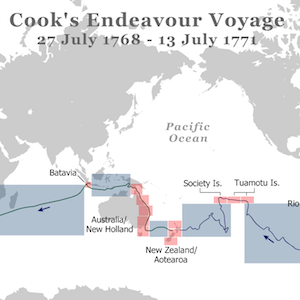The South Seas
A useful site for the study of children in the Pacific Basin is The South Seas, a resource database dedicated to European voyages from 1760 to 1800. Currently in its first phase of development, the site makes accessible online for singular or comparative research the full manuscripts of the journals of James Cook, John Banks, and Sydney Parkinson from the Endeavor voyage of 1768-1771. Also available are all three volumes of John Hawkesworth's Account of the Voyages undertaken. . . in the Southern Hemisphere. . . (1773). While this is currently a literary resource database only, there are links for future access to the National Library of Australia's (NLA) collections of historical images, rare maps and drawings from this period.
Easily navigable for browsing, the site has all the key headings intuitively placed. It is well indexed and, while basic, functions adequately with manageable returns. Although not part of the historical collection, there are a few maps presented that are particularly interesting as they chart the day-by-day progress of Cook's Endeavor. The South Seas Companion is the main searching page from which you can browse such topics as: Concepts, Parties, Cultural Artifacts, Natural Phenomena, People, Places, Repositories, and Functions. Unfortunately, these are not clickable and one must browse alphabetically within each heading. Thus it is not really browsing and is actually quite time consuming to achieve a real overview using this method. There are four different search menus catering to different research needs, Keyword, Structured, Bibliography and Archival Sources.
South Seas provides primary sources for research on the people encountered on Cook's voyages, by himself, Banks and Parkinson. From the home page keyword search for "child," for example, there are 78 results that include original sketches and journal descriptions of children, their place and function Tahiti and New Zealand. In James Morrison's Account of Tahiti, he describes the rituals associated with the birth of a new child, feeding and touching taboos, and filial obligations and rights.
Because of the way South Seas has designed the keyword search, "child" will also return other results such as, "child-like" and "childish," which typically refer to adult behavior not children's. As well, results for specific terms, such as "boy" actually include all words containing the consecutive letters, including "boys" and "boyer." With 63 returns under the keyword "girl or girls," there is an interesting variety of information indexed with topics ranging from tattooing to cannibalism and the "rites of Venus." Considering the character of these resources written by men on long sea voyages, it should come as no surprise that most of the references to girls are of a sexual nature. As with all texts describing first contact, what the men chose to write about, the judgments they made, and the situations they created is more revealing of their own characters and culture than the one they are "observing."
While South Seas is full of primary references and resources useful for research, it is not geared towards teaching. There are no tools, widgets, or favorites to assist in saving searches, returns or sharing the images or data. This is described as the first phase of a greater project that the NLA is undertaking to create a clearinghouse of resources related to European voyaging in the South Pacific and cross-cultural contact. Yet it is not quite complete as there are several pages in the "About" section still being built. The Cultural Atlas section has maps available to track the path of the voyages, the images section has this message on its homepage: "We aim also to have a multimedia-guide to using South Seas to discover historical images and rare maps online here in early 2004."
Much of the true functionality of this website has yet to be achieved. However, judging from the year of the last updates, a second phase may not be forthcoming.
